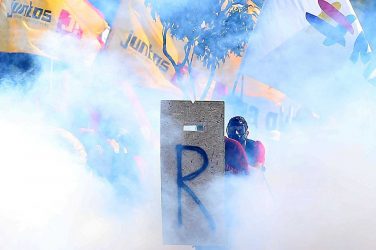Impeached Deputy Eduardo Cunha was arrested this Wednesday, October 19, in Brazilian capital Brasilia, under Operation Car Wash. The preventive detention of the former lower house speaker was ordered by Judge Sergio Moro, in charge of Operation Car Wash cases in the first instance.
The Federal Police confirmed the preventive detention and said Cunha will be arrested in Curitiba city, under responsibility of the justice of Paraná state, where suspects are being sentenced for the actions related to Car Wash.
Before being impeached by the House of Representatives on September 12, Cunha faced at least four other inquiries and criminal cases at the Supreme Court (STF) for corruption and money laundering.
In the case, the Supreme Court held that there was evidence that the then deputy received US$ 1.57 million in kickbacks over Petrobras drillship contracts.
With the loss of the jurisdictional prerogative rights granted to congressmen, proceedings against him related in Operation Car Wash were sent to Judge Sergio Moro.
In his sentence, Moro pointed out the alleged secret bank accounts in Switzerland, which was repeatedly denied by Cunha. “While we cannot fully track back the money and totally identify its current location, there is a risk of dissipation of the product of crime, thus derailing its recovery.”
Moro has also presented as argument the great risk of escape, since Cunha could use illegal resources saved abroad to facilitate his own escape and refuge abroad.
Cunha was arrested in his home in Brasília. He was the chief architect behind the impeachment of Brazilian president Dilma Rousseff.
Preventative pre-trial detentions like Cunha’s are common in cases when the accused is considered a flight risk, as he is due to his wealth and dual Brazilian-Italian citizenship, according to federal Judge Sergio Moro, who authorized the arrest.
Moro also issued a warrant for Cunha’s home in Rio de Janeiro to be searched. The arrest comes just days after Moro issued a subpoena for Cunha to face charges over accusations that he hid laundered money in secret Swiss bank accounts while in office.
The alleged crimes are under investigation as part of country’s major anti-fraud probe known as Operation Car Wash, focused on uncovering rampant bribery in the state-run oil company, Petrobras.
Cunha, a member of President Michel Temer’s PMDB party, is accused of corruption, money laundering and tax evasion linked to raking in at least US$ 5 million in illicit kickbacks between 2006 and 2012 and hiding the wealth in Swiss bank accounts.
Cunha was removed from his position as speaker of the lower house after being suspended in May, just weeks after the lower house pushed through the impeachment bid against Rousseff. Congress voted overwhelmingly by 450 to 10 to remove the unpopular politician.
The decision also stripped Cunha of the parliamentary immunity he long enjoyed, opening him up to corruption charges. Despite the power he has wielded over Brazilian politics, recent polling has repeatedly unmasked Cunha as one of the most unpopular politicians in the country, including among his own party.
Cunha’s arrest is only the most recent in a string of high-profile detentions resulting from the Operation Car Wash investigation into pervasive corruption in Petrobras.
Cunha said last month he would write a book exposing the machinations that led to Rousseff’s ouster. Brazilian media have called the disgraced politician a “walking time bomb” because of his potential to take former colleagues down with him.
Rousseff has consistently described the impeachment drive, by Cunha and current President of Brazil Michel Temer, as a coup. Cunha began calls for her impeachment on allegations that she used accounting tricks to obscure the country’s budget deficit at the end of 2015.
Temer, Rousseff’s running mate, pulled his Brazilian Democratic Movement Party out of Rousseff’s coalition government a few months later. Rousseff maintains that her government’s methods of calculating the budget – which involved transferring funds from state banks to cover social programs facing short-term deficits – were commonly used in previous administrations and the impeachment was an effort to move her Worker’s Party out of power.
There are speculations that Cunha bribed fellow lawmakers to support his calls for impeachment. The Wall Street Journal reported in April that the Transparência Brasil nonprofit organization found that 60 percent of Brazil’s federal legislators have been convicted, or are under investigation, for crimes including corruption, electoral fraud and assault.
Former President Luiz Inácio Lula da Silva is also under investigation through Operation Car Wash, as is President of the Senate Renan Calheiros and many former ministers, heads of political parties and other high-ranking officials.
ABr



